Management Accounting: Tools, Systems, and Financial Problem Solutions
VerifiedAdded on 2022/09/16
|11
|1949
|18
Report
AI Summary
This report delves into the realm of management accounting, focusing on the planning tools employed by organizations and their responses to financial problems. It covers budgetary control, highlighting its advantages and limitations across various methods like cash flow budgeting, capital budgeting, zero-based budgeting, rolling budgets, and operational budgets. The report further examines how management accountants utilize planning tools such as cost accounting, budgetary control, financial statement analysis, and pricing strategies to prepare budgets and gain a competitive edge. Key Performance Indicators (KPIs) are discussed in the context of internal processes and strategic goal achievement, along with their pros and cons. Finally, the Carillion scandal is referenced to illustrate the importance of accurate financial reporting and the potential conflicts of interest in auditing. Desklib offers a platform to access this and many other solved assignments.
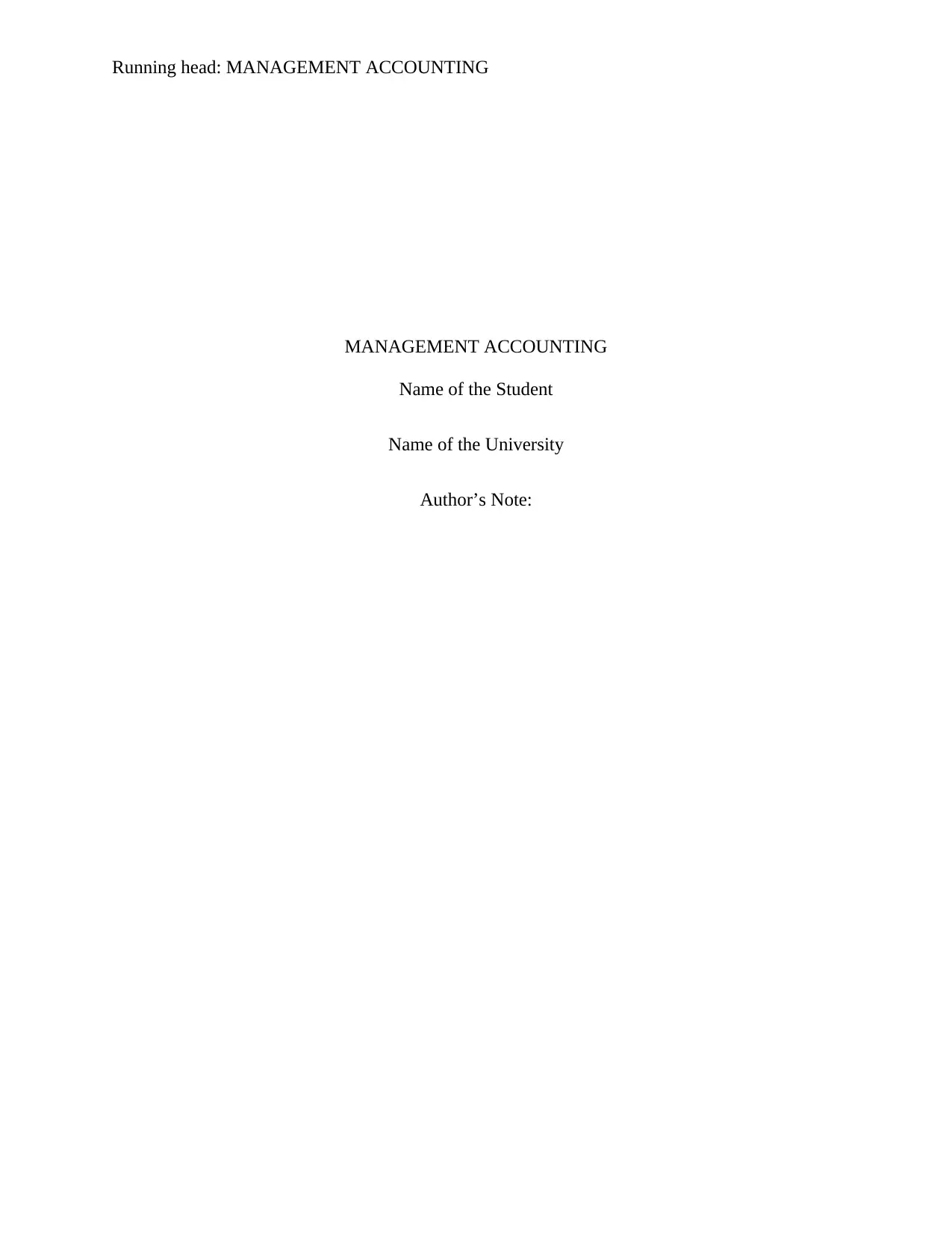
Running head: MANAGEMENT ACCOUNTING
MANAGEMENT ACCOUNTING
Name of the Student
Name of the University
Author’s Note:
MANAGEMENT ACCOUNTING
Name of the Student
Name of the University
Author’s Note:
Paraphrase This Document
Need a fresh take? Get an instant paraphrase of this document with our AI Paraphraser
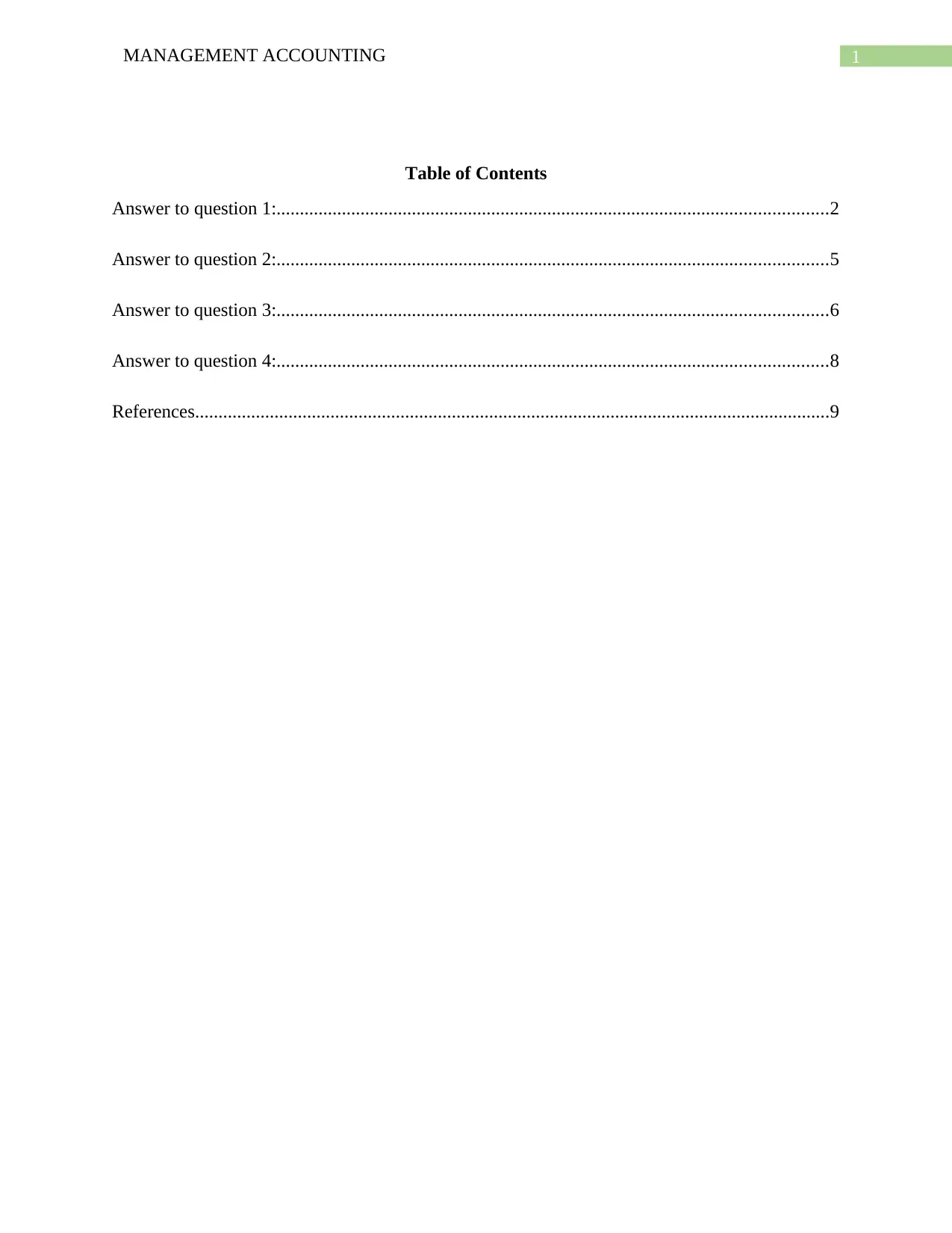
1MANAGEMENT ACCOUNTING
Table of Contents
Answer to question 1:......................................................................................................................2
Answer to question 2:......................................................................................................................5
Answer to question 3:......................................................................................................................6
Answer to question 4:......................................................................................................................8
References........................................................................................................................................9
Table of Contents
Answer to question 1:......................................................................................................................2
Answer to question 2:......................................................................................................................5
Answer to question 3:......................................................................................................................6
Answer to question 4:......................................................................................................................8
References........................................................................................................................................9
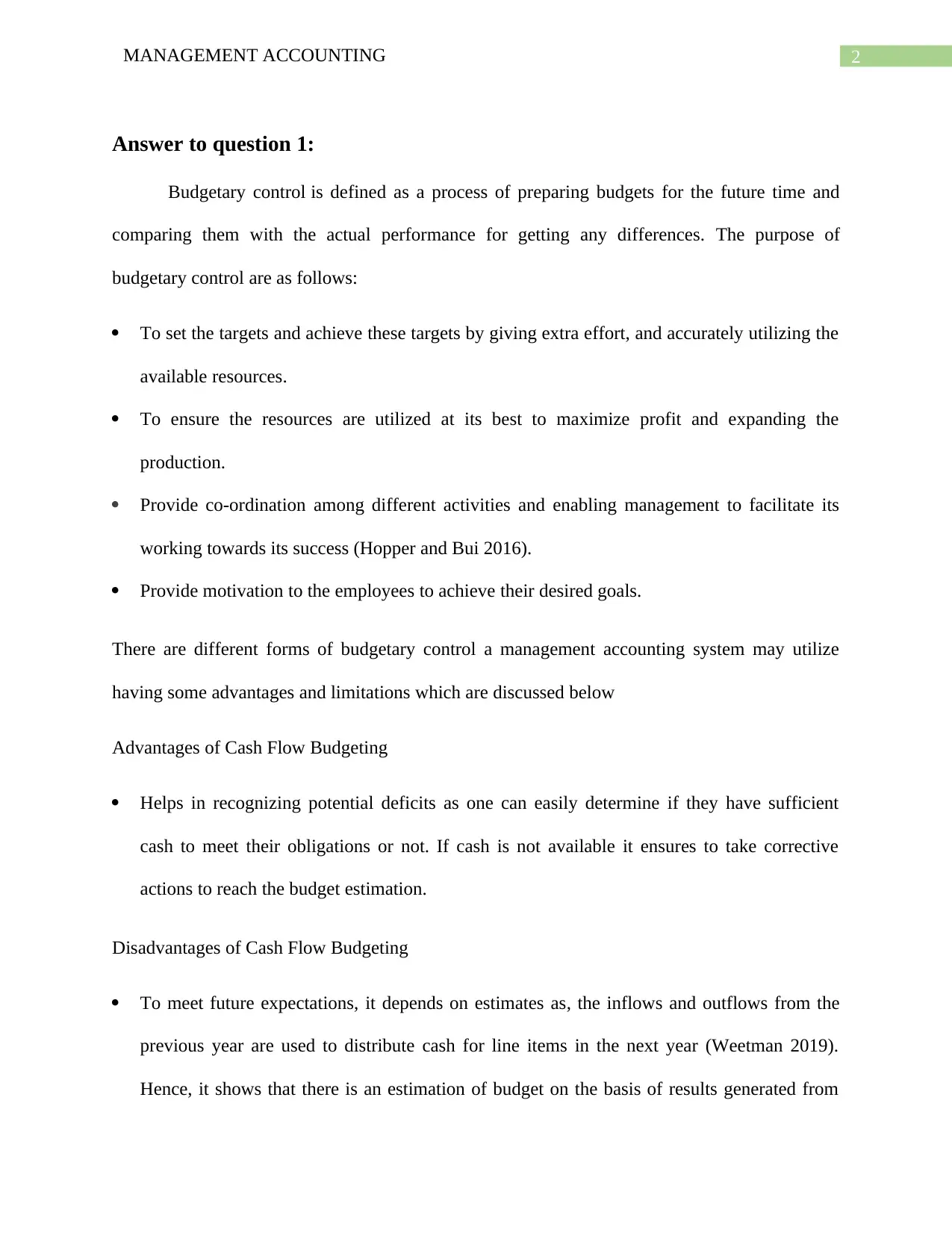
2MANAGEMENT ACCOUNTING
Answer to question 1:
Budgetary control is defined as a process of preparing budgets for the future time and
comparing them with the actual performance for getting any differences. The purpose of
budgetary control are as follows:
To set the targets and achieve these targets by giving extra effort, and accurately utilizing the
available resources.
To ensure the resources are utilized at its best to maximize profit and expanding the
production.
Provide co-ordination among different activities and enabling management to facilitate its
working towards its success (Hopper and Bui 2016).
Provide motivation to the employees to achieve their desired goals.
There are different forms of budgetary control a management accounting system may utilize
having some advantages and limitations which are discussed below
Advantages of Cash Flow Budgeting
Helps in recognizing potential deficits as one can easily determine if they have sufficient
cash to meet their obligations or not. If cash is not available it ensures to take corrective
actions to reach the budget estimation.
Disadvantages of Cash Flow Budgeting
To meet future expectations, it depends on estimates as, the inflows and outflows from the
previous year are used to distribute cash for line items in the next year (Weetman 2019).
Hence, it shows that there is an estimation of budget on the basis of results generated from
Answer to question 1:
Budgetary control is defined as a process of preparing budgets for the future time and
comparing them with the actual performance for getting any differences. The purpose of
budgetary control are as follows:
To set the targets and achieve these targets by giving extra effort, and accurately utilizing the
available resources.
To ensure the resources are utilized at its best to maximize profit and expanding the
production.
Provide co-ordination among different activities and enabling management to facilitate its
working towards its success (Hopper and Bui 2016).
Provide motivation to the employees to achieve their desired goals.
There are different forms of budgetary control a management accounting system may utilize
having some advantages and limitations which are discussed below
Advantages of Cash Flow Budgeting
Helps in recognizing potential deficits as one can easily determine if they have sufficient
cash to meet their obligations or not. If cash is not available it ensures to take corrective
actions to reach the budget estimation.
Disadvantages of Cash Flow Budgeting
To meet future expectations, it depends on estimates as, the inflows and outflows from the
previous year are used to distribute cash for line items in the next year (Weetman 2019).
Hence, it shows that there is an estimation of budget on the basis of results generated from
⊘ This is a preview!⊘
Do you want full access?
Subscribe today to unlock all pages.

Trusted by 1+ million students worldwide
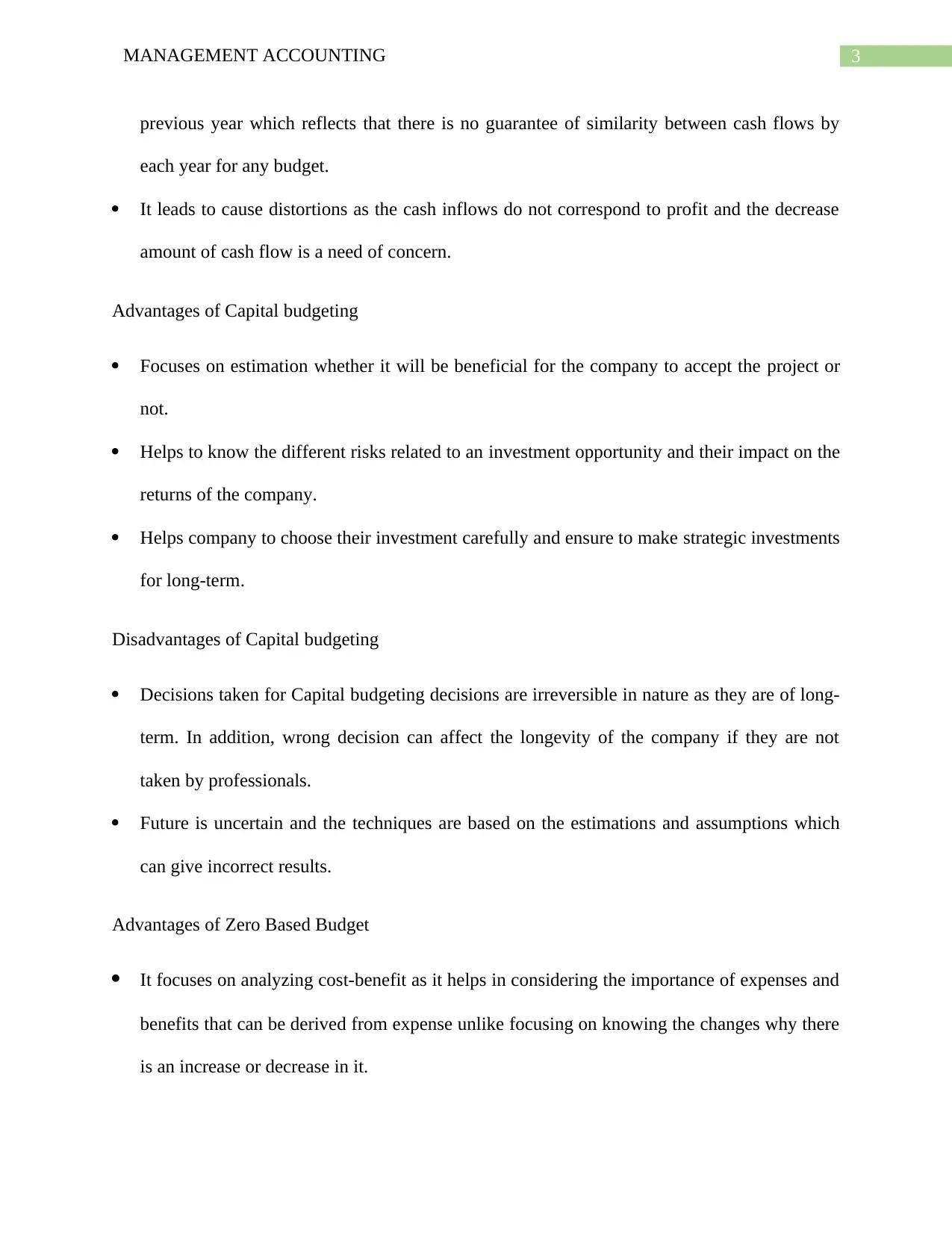
3MANAGEMENT ACCOUNTING
previous year which reflects that there is no guarantee of similarity between cash flows by
each year for any budget.
It leads to cause distortions as the cash inflows do not correspond to profit and the decrease
amount of cash flow is a need of concern.
Advantages of Capital budgeting
Focuses on estimation whether it will be beneficial for the company to accept the project or
not.
Helps to know the different risks related to an investment opportunity and their impact on the
returns of the company.
Helps company to choose their investment carefully and ensure to make strategic investments
for long-term.
Disadvantages of Capital budgeting
Decisions taken for Capital budgeting decisions are irreversible in nature as they are of long-
term. In addition, wrong decision can affect the longevity of the company if they are not
taken by professionals.
Future is uncertain and the techniques are based on the estimations and assumptions which
can give incorrect results.
Advantages of Zero Based Budget
It focuses on analyzing cost-benefit as it helps in considering the importance of expenses and
benefits that can be derived from expense unlike focusing on knowing the changes why there
is an increase or decrease in it.
previous year which reflects that there is no guarantee of similarity between cash flows by
each year for any budget.
It leads to cause distortions as the cash inflows do not correspond to profit and the decrease
amount of cash flow is a need of concern.
Advantages of Capital budgeting
Focuses on estimation whether it will be beneficial for the company to accept the project or
not.
Helps to know the different risks related to an investment opportunity and their impact on the
returns of the company.
Helps company to choose their investment carefully and ensure to make strategic investments
for long-term.
Disadvantages of Capital budgeting
Decisions taken for Capital budgeting decisions are irreversible in nature as they are of long-
term. In addition, wrong decision can affect the longevity of the company if they are not
taken by professionals.
Future is uncertain and the techniques are based on the estimations and assumptions which
can give incorrect results.
Advantages of Zero Based Budget
It focuses on analyzing cost-benefit as it helps in considering the importance of expenses and
benefits that can be derived from expense unlike focusing on knowing the changes why there
is an increase or decrease in it.
Paraphrase This Document
Need a fresh take? Get an instant paraphrase of this document with our AI Paraphraser
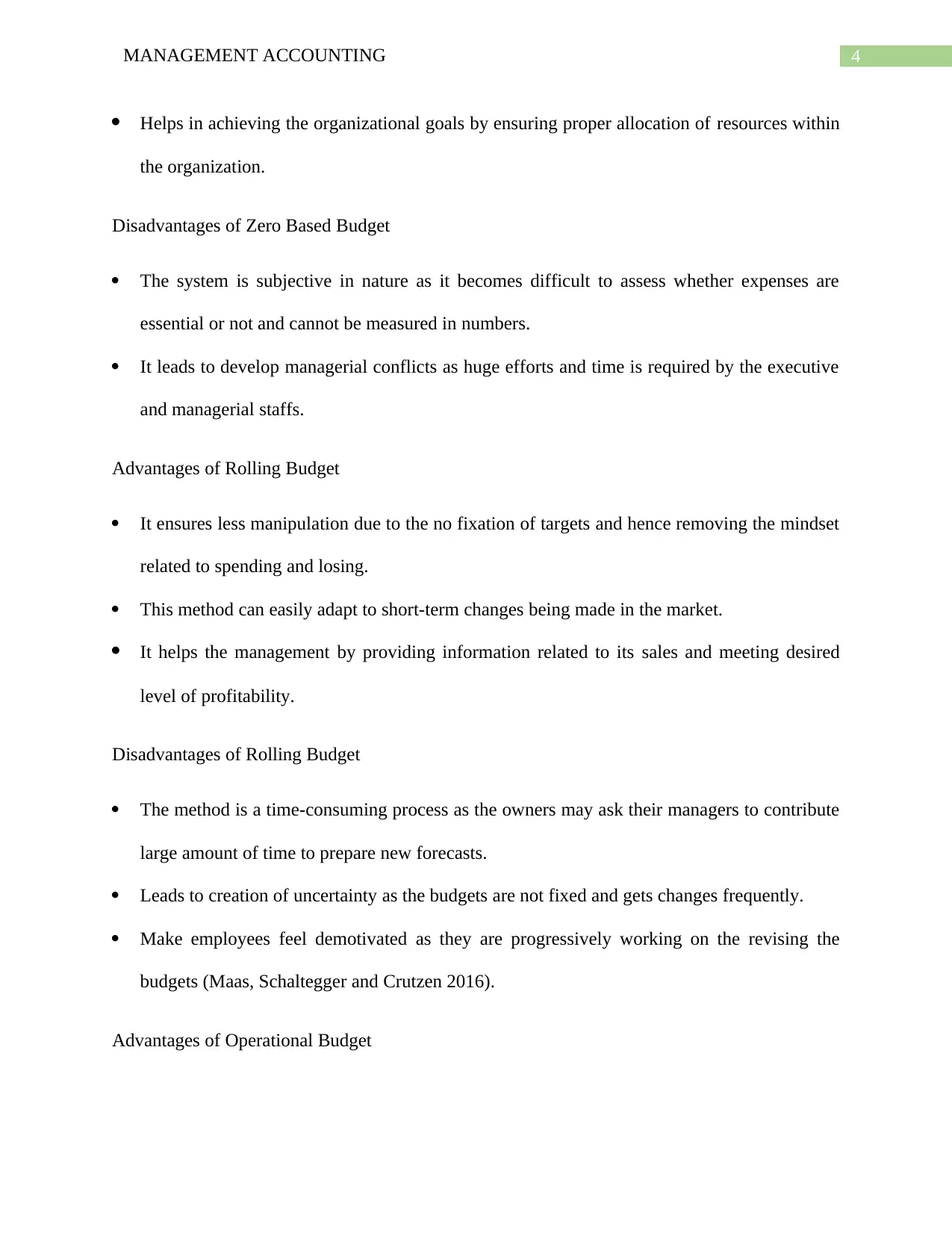
4MANAGEMENT ACCOUNTING
Helps in achieving the organizational goals by ensuring proper allocation of resources within
the organization.
Disadvantages of Zero Based Budget
The system is subjective in nature as it becomes difficult to assess whether expenses are
essential or not and cannot be measured in numbers.
It leads to develop managerial conflicts as huge efforts and time is required by the executive
and managerial staffs.
Advantages of Rolling Budget
It ensures less manipulation due to the no fixation of targets and hence removing the mindset
related to spending and losing.
This method can easily adapt to short-term changes being made in the market.
It helps the management by providing information related to its sales and meeting desired
level of profitability.
Disadvantages of Rolling Budget
The method is a time-consuming process as the owners may ask their managers to contribute
large amount of time to prepare new forecasts.
Leads to creation of uncertainty as the budgets are not fixed and gets changes frequently.
Make employees feel demotivated as they are progressively working on the revising the
budgets (Maas, Schaltegger and Crutzen 2016).
Advantages of Operational Budget
Helps in achieving the organizational goals by ensuring proper allocation of resources within
the organization.
Disadvantages of Zero Based Budget
The system is subjective in nature as it becomes difficult to assess whether expenses are
essential or not and cannot be measured in numbers.
It leads to develop managerial conflicts as huge efforts and time is required by the executive
and managerial staffs.
Advantages of Rolling Budget
It ensures less manipulation due to the no fixation of targets and hence removing the mindset
related to spending and losing.
This method can easily adapt to short-term changes being made in the market.
It helps the management by providing information related to its sales and meeting desired
level of profitability.
Disadvantages of Rolling Budget
The method is a time-consuming process as the owners may ask their managers to contribute
large amount of time to prepare new forecasts.
Leads to creation of uncertainty as the budgets are not fixed and gets changes frequently.
Make employees feel demotivated as they are progressively working on the revising the
budgets (Maas, Schaltegger and Crutzen 2016).
Advantages of Operational Budget
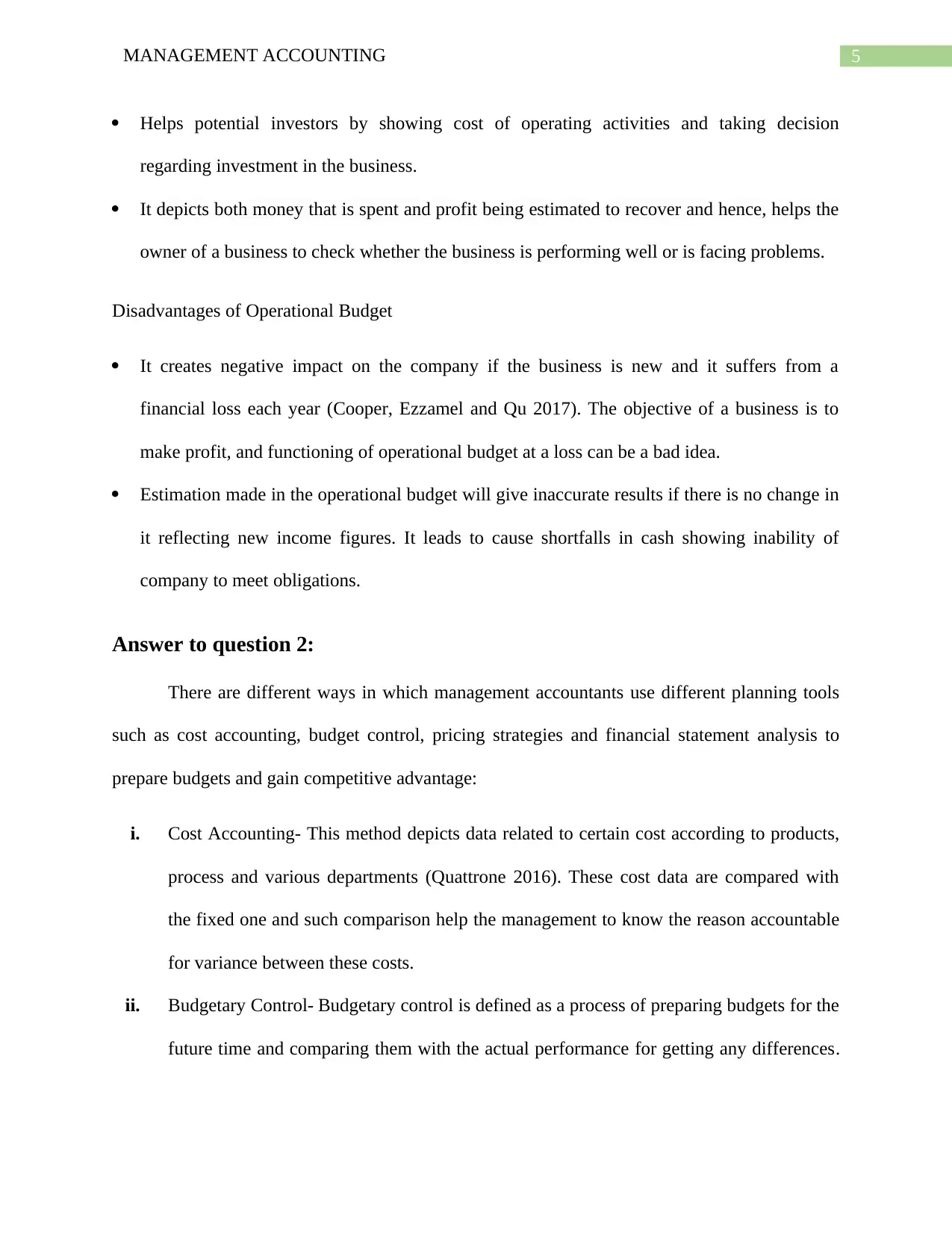
5MANAGEMENT ACCOUNTING
Helps potential investors by showing cost of operating activities and taking decision
regarding investment in the business.
It depicts both money that is spent and profit being estimated to recover and hence, helps the
owner of a business to check whether the business is performing well or is facing problems.
Disadvantages of Operational Budget
It creates negative impact on the company if the business is new and it suffers from a
financial loss each year (Cooper, Ezzamel and Qu 2017). The objective of a business is to
make profit, and functioning of operational budget at a loss can be a bad idea.
Estimation made in the operational budget will give inaccurate results if there is no change in
it reflecting new income figures. It leads to cause shortfalls in cash showing inability of
company to meet obligations.
Answer to question 2:
There are different ways in which management accountants use different planning tools
such as cost accounting, budget control, pricing strategies and financial statement analysis to
prepare budgets and gain competitive advantage:
i. Cost Accounting- This method depicts data related to certain cost according to products,
process and various departments (Quattrone 2016). These cost data are compared with
the fixed one and such comparison help the management to know the reason accountable
for variance between these costs.
ii. Budgetary Control- Budgetary control is defined as a process of preparing budgets for the
future time and comparing them with the actual performance for getting any differences.
Helps potential investors by showing cost of operating activities and taking decision
regarding investment in the business.
It depicts both money that is spent and profit being estimated to recover and hence, helps the
owner of a business to check whether the business is performing well or is facing problems.
Disadvantages of Operational Budget
It creates negative impact on the company if the business is new and it suffers from a
financial loss each year (Cooper, Ezzamel and Qu 2017). The objective of a business is to
make profit, and functioning of operational budget at a loss can be a bad idea.
Estimation made in the operational budget will give inaccurate results if there is no change in
it reflecting new income figures. It leads to cause shortfalls in cash showing inability of
company to meet obligations.
Answer to question 2:
There are different ways in which management accountants use different planning tools
such as cost accounting, budget control, pricing strategies and financial statement analysis to
prepare budgets and gain competitive advantage:
i. Cost Accounting- This method depicts data related to certain cost according to products,
process and various departments (Quattrone 2016). These cost data are compared with
the fixed one and such comparison help the management to know the reason accountable
for variance between these costs.
ii. Budgetary Control- Budgetary control is defined as a process of preparing budgets for the
future time and comparing them with the actual performance for getting any differences.
⊘ This is a preview!⊘
Do you want full access?
Subscribe today to unlock all pages.

Trusted by 1+ million students worldwide
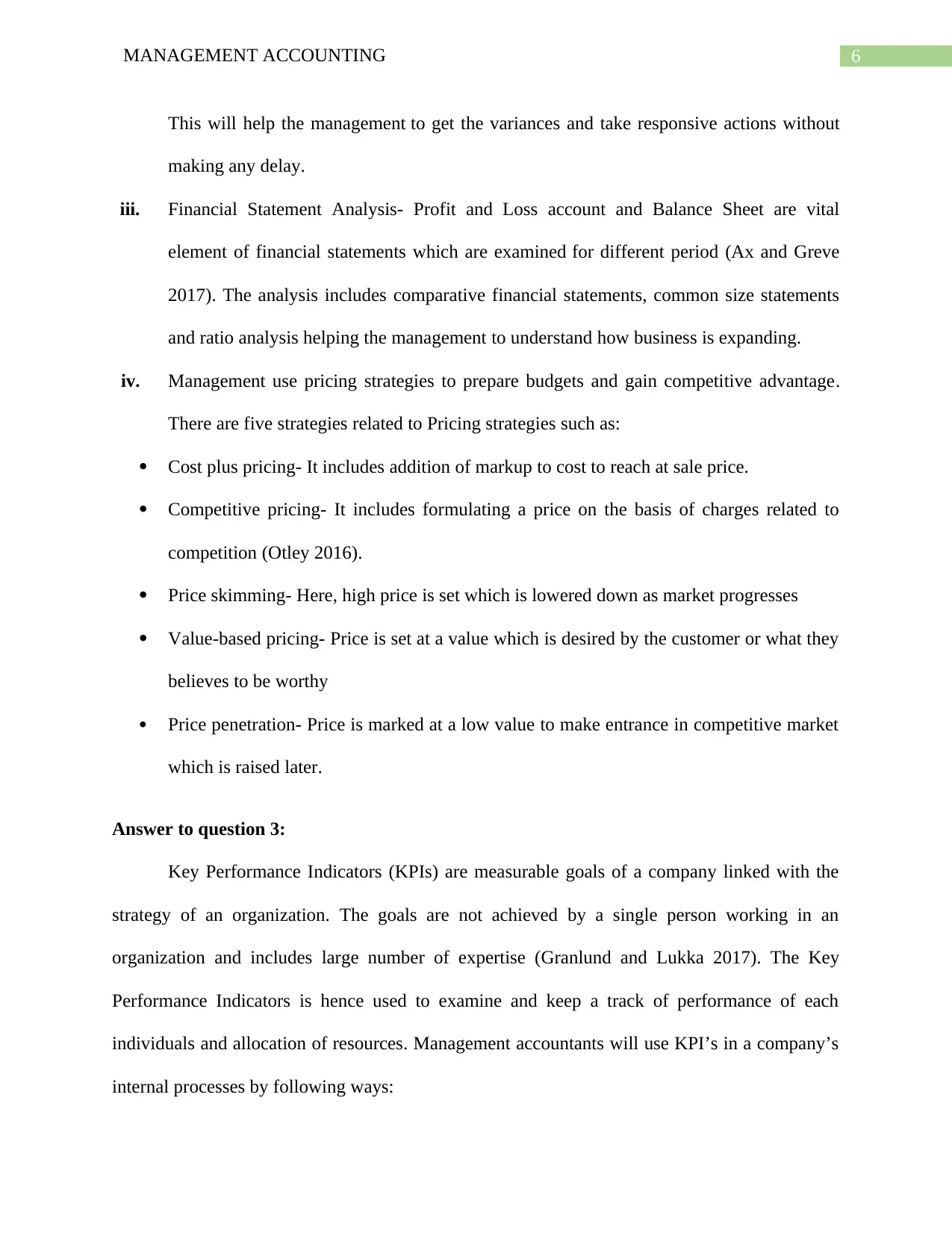
6MANAGEMENT ACCOUNTING
This will help the management to get the variances and take responsive actions without
making any delay.
iii. Financial Statement Analysis- Profit and Loss account and Balance Sheet are vital
element of financial statements which are examined for different period (Ax and Greve
2017). The analysis includes comparative financial statements, common size statements
and ratio analysis helping the management to understand how business is expanding.
iv. Management use pricing strategies to prepare budgets and gain competitive advantage.
There are five strategies related to Pricing strategies such as:
Cost plus pricing- It includes addition of markup to cost to reach at sale price.
Competitive pricing- It includes formulating a price on the basis of charges related to
competition (Otley 2016).
Price skimming- Here, high price is set which is lowered down as market progresses
Value-based pricing- Price is set at a value which is desired by the customer or what they
believes to be worthy
Price penetration- Price is marked at a low value to make entrance in competitive market
which is raised later.
Answer to question 3:
Key Performance Indicators (KPIs) are measurable goals of a company linked with the
strategy of an organization. The goals are not achieved by a single person working in an
organization and includes large number of expertise (Granlund and Lukka 2017). The Key
Performance Indicators is hence used to examine and keep a track of performance of each
individuals and allocation of resources. Management accountants will use KPI’s in a company’s
internal processes by following ways:
This will help the management to get the variances and take responsive actions without
making any delay.
iii. Financial Statement Analysis- Profit and Loss account and Balance Sheet are vital
element of financial statements which are examined for different period (Ax and Greve
2017). The analysis includes comparative financial statements, common size statements
and ratio analysis helping the management to understand how business is expanding.
iv. Management use pricing strategies to prepare budgets and gain competitive advantage.
There are five strategies related to Pricing strategies such as:
Cost plus pricing- It includes addition of markup to cost to reach at sale price.
Competitive pricing- It includes formulating a price on the basis of charges related to
competition (Otley 2016).
Price skimming- Here, high price is set which is lowered down as market progresses
Value-based pricing- Price is set at a value which is desired by the customer or what they
believes to be worthy
Price penetration- Price is marked at a low value to make entrance in competitive market
which is raised later.
Answer to question 3:
Key Performance Indicators (KPIs) are measurable goals of a company linked with the
strategy of an organization. The goals are not achieved by a single person working in an
organization and includes large number of expertise (Granlund and Lukka 2017). The Key
Performance Indicators is hence used to examine and keep a track of performance of each
individuals and allocation of resources. Management accountants will use KPI’s in a company’s
internal processes by following ways:
Paraphrase This Document
Need a fresh take? Get an instant paraphrase of this document with our AI Paraphraser
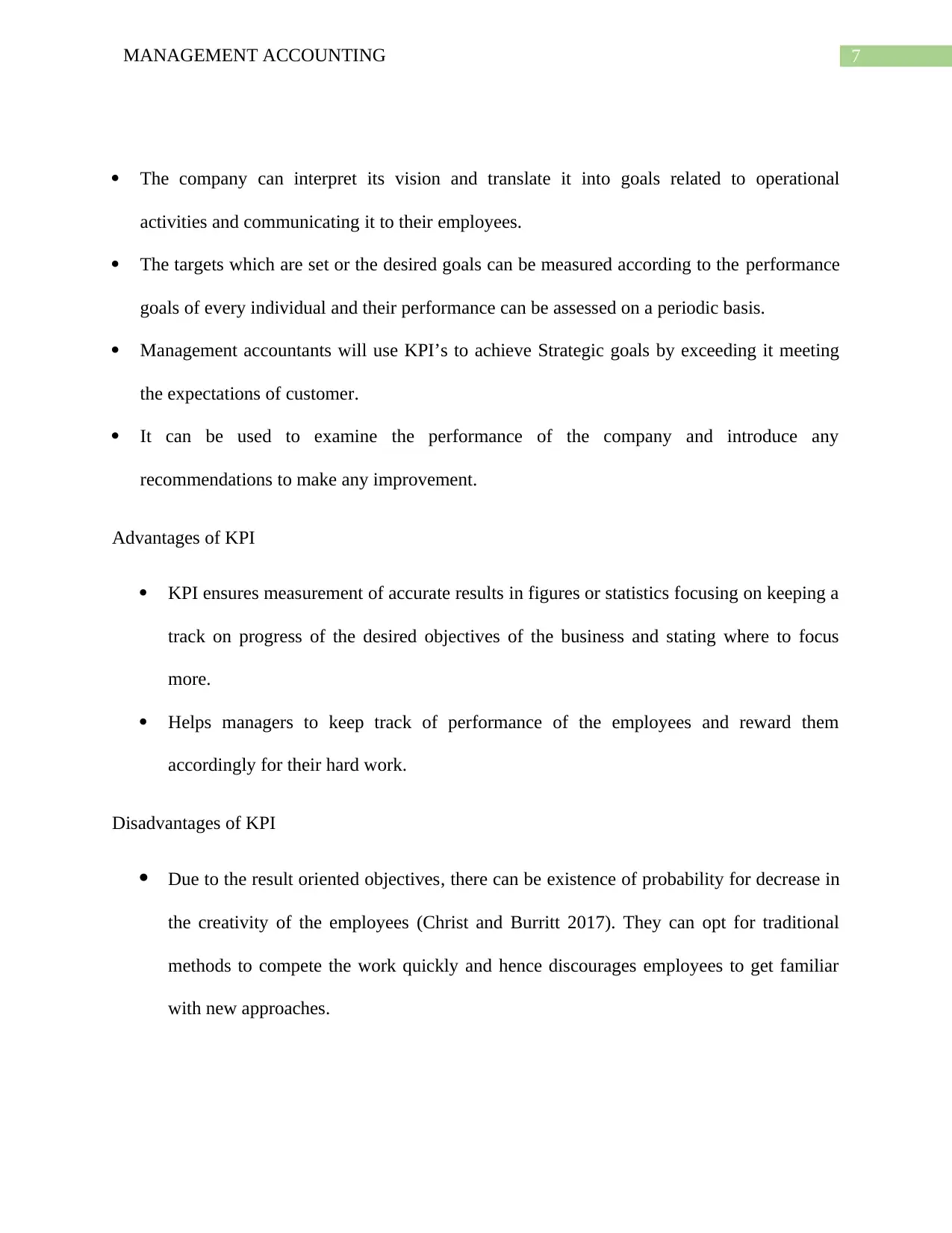
7MANAGEMENT ACCOUNTING
The company can interpret its vision and translate it into goals related to operational
activities and communicating it to their employees.
The targets which are set or the desired goals can be measured according to the performance
goals of every individual and their performance can be assessed on a periodic basis.
Management accountants will use KPI’s to achieve Strategic goals by exceeding it meeting
the expectations of customer.
It can be used to examine the performance of the company and introduce any
recommendations to make any improvement.
Advantages of KPI
KPI ensures measurement of accurate results in figures or statistics focusing on keeping a
track on progress of the desired objectives of the business and stating where to focus
more.
Helps managers to keep track of performance of the employees and reward them
accordingly for their hard work.
Disadvantages of KPI
Due to the result oriented objectives, there can be existence of probability for decrease in
the creativity of the employees (Christ and Burritt 2017). They can opt for traditional
methods to compete the work quickly and hence discourages employees to get familiar
with new approaches.
The company can interpret its vision and translate it into goals related to operational
activities and communicating it to their employees.
The targets which are set or the desired goals can be measured according to the performance
goals of every individual and their performance can be assessed on a periodic basis.
Management accountants will use KPI’s to achieve Strategic goals by exceeding it meeting
the expectations of customer.
It can be used to examine the performance of the company and introduce any
recommendations to make any improvement.
Advantages of KPI
KPI ensures measurement of accurate results in figures or statistics focusing on keeping a
track on progress of the desired objectives of the business and stating where to focus
more.
Helps managers to keep track of performance of the employees and reward them
accordingly for their hard work.
Disadvantages of KPI
Due to the result oriented objectives, there can be existence of probability for decrease in
the creativity of the employees (Christ and Burritt 2017). They can opt for traditional
methods to compete the work quickly and hence discourages employees to get familiar
with new approaches.
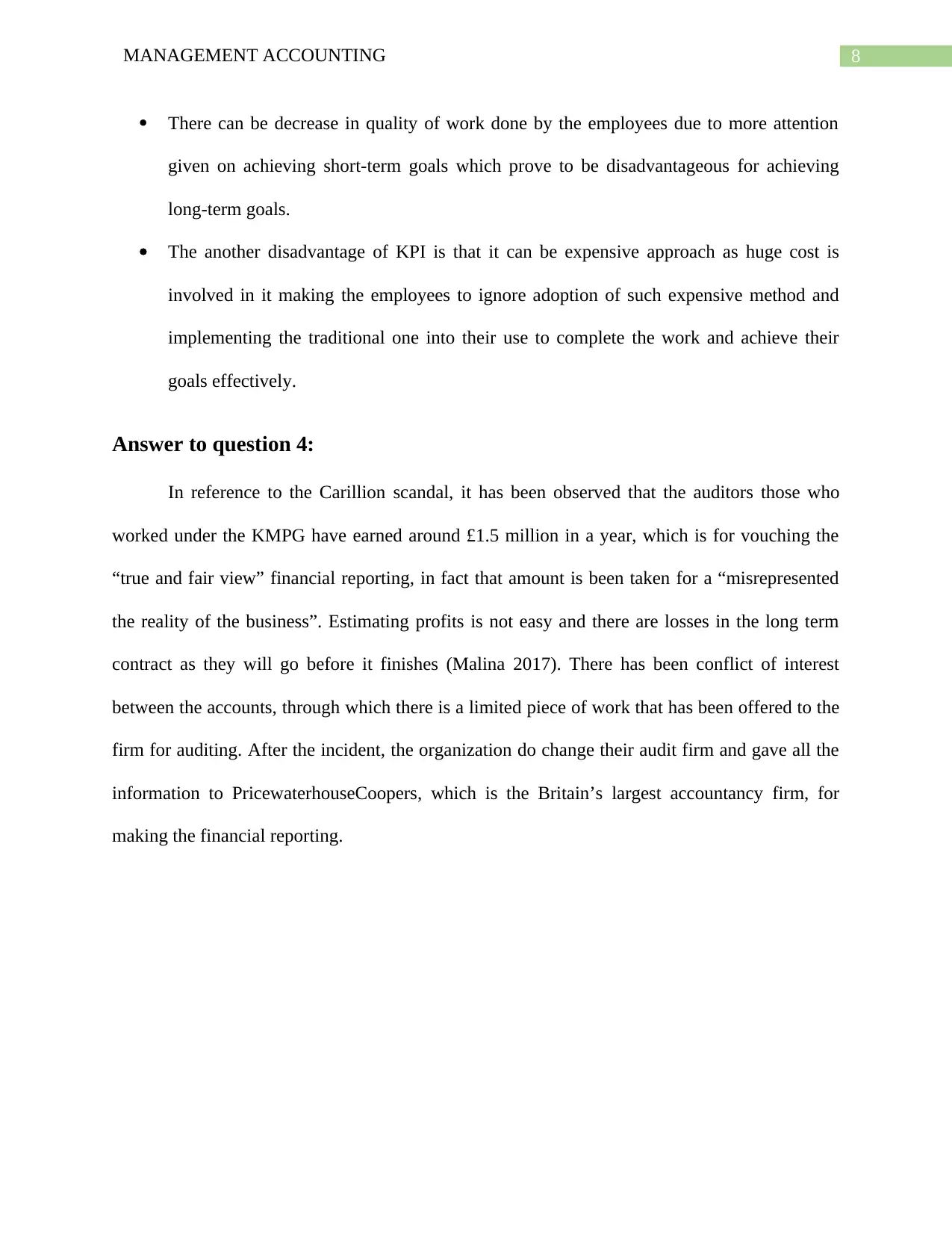
8MANAGEMENT ACCOUNTING
There can be decrease in quality of work done by the employees due to more attention
given on achieving short-term goals which prove to be disadvantageous for achieving
long-term goals.
The another disadvantage of KPI is that it can be expensive approach as huge cost is
involved in it making the employees to ignore adoption of such expensive method and
implementing the traditional one into their use to complete the work and achieve their
goals effectively.
Answer to question 4:
In reference to the Carillion scandal, it has been observed that the auditors those who
worked under the KMPG have earned around £1.5 million in a year, which is for vouching the
“true and fair view” financial reporting, in fact that amount is been taken for a “misrepresented
the reality of the business”. Estimating profits is not easy and there are losses in the long term
contract as they will go before it finishes (Malina 2017). There has been conflict of interest
between the accounts, through which there is a limited piece of work that has been offered to the
firm for auditing. After the incident, the organization do change their audit firm and gave all the
information to PricewaterhouseCoopers, which is the Britain’s largest accountancy firm, for
making the financial reporting.
There can be decrease in quality of work done by the employees due to more attention
given on achieving short-term goals which prove to be disadvantageous for achieving
long-term goals.
The another disadvantage of KPI is that it can be expensive approach as huge cost is
involved in it making the employees to ignore adoption of such expensive method and
implementing the traditional one into their use to complete the work and achieve their
goals effectively.
Answer to question 4:
In reference to the Carillion scandal, it has been observed that the auditors those who
worked under the KMPG have earned around £1.5 million in a year, which is for vouching the
“true and fair view” financial reporting, in fact that amount is been taken for a “misrepresented
the reality of the business”. Estimating profits is not easy and there are losses in the long term
contract as they will go before it finishes (Malina 2017). There has been conflict of interest
between the accounts, through which there is a limited piece of work that has been offered to the
firm for auditing. After the incident, the organization do change their audit firm and gave all the
information to PricewaterhouseCoopers, which is the Britain’s largest accountancy firm, for
making the financial reporting.
⊘ This is a preview!⊘
Do you want full access?
Subscribe today to unlock all pages.

Trusted by 1+ million students worldwide
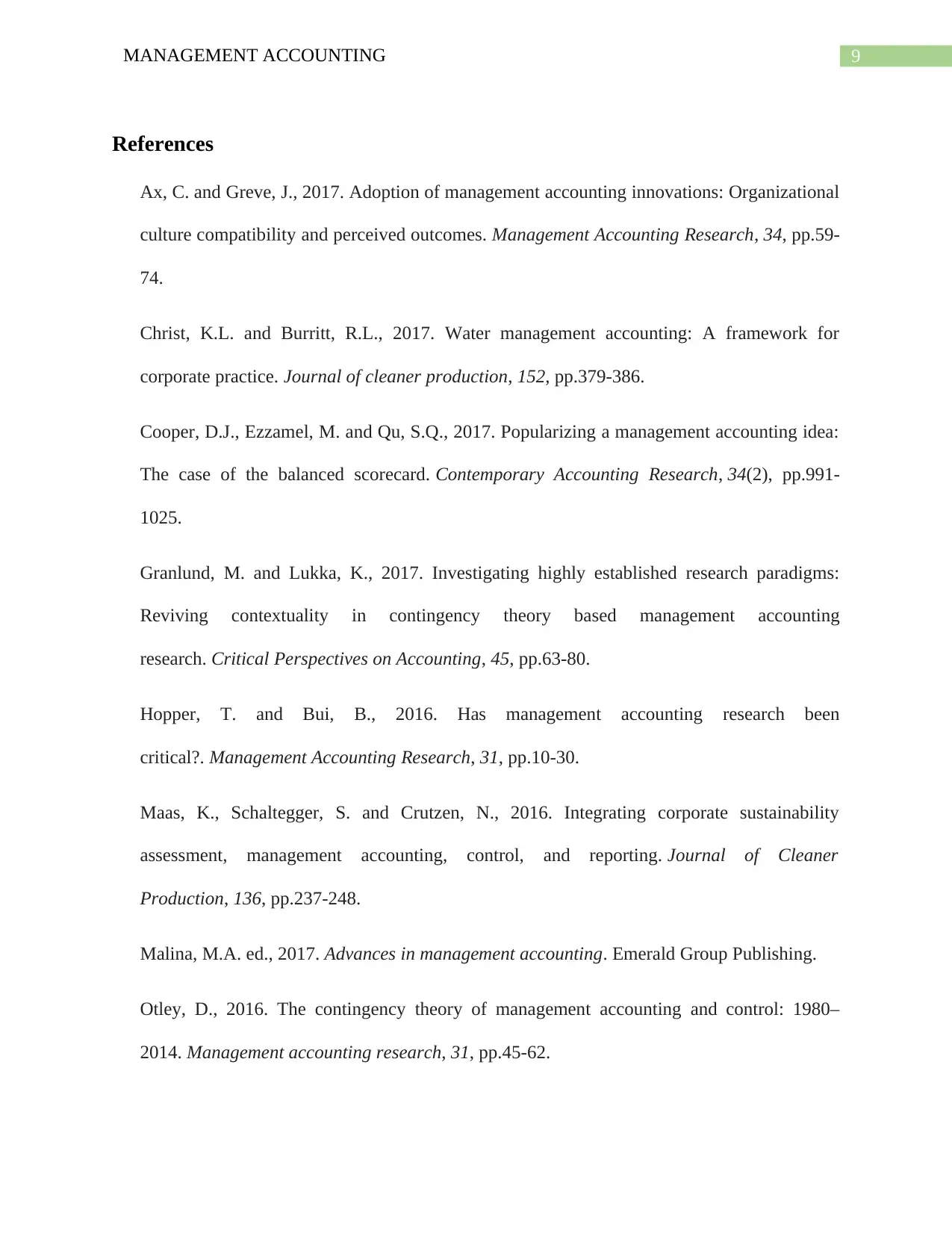
9MANAGEMENT ACCOUNTING
References
Ax, C. and Greve, J., 2017. Adoption of management accounting innovations: Organizational
culture compatibility and perceived outcomes. Management Accounting Research, 34, pp.59-
74.
Christ, K.L. and Burritt, R.L., 2017. Water management accounting: A framework for
corporate practice. Journal of cleaner production, 152, pp.379-386.
Cooper, D.J., Ezzamel, M. and Qu, S.Q., 2017. Popularizing a management accounting idea:
The case of the balanced scorecard. Contemporary Accounting Research, 34(2), pp.991-
1025.
Granlund, M. and Lukka, K., 2017. Investigating highly established research paradigms:
Reviving contextuality in contingency theory based management accounting
research. Critical Perspectives on Accounting, 45, pp.63-80.
Hopper, T. and Bui, B., 2016. Has management accounting research been
critical?. Management Accounting Research, 31, pp.10-30.
Maas, K., Schaltegger, S. and Crutzen, N., 2016. Integrating corporate sustainability
assessment, management accounting, control, and reporting. Journal of Cleaner
Production, 136, pp.237-248.
Malina, M.A. ed., 2017. Advances in management accounting. Emerald Group Publishing.
Otley, D., 2016. The contingency theory of management accounting and control: 1980–
2014. Management accounting research, 31, pp.45-62.
References
Ax, C. and Greve, J., 2017. Adoption of management accounting innovations: Organizational
culture compatibility and perceived outcomes. Management Accounting Research, 34, pp.59-
74.
Christ, K.L. and Burritt, R.L., 2017. Water management accounting: A framework for
corporate practice. Journal of cleaner production, 152, pp.379-386.
Cooper, D.J., Ezzamel, M. and Qu, S.Q., 2017. Popularizing a management accounting idea:
The case of the balanced scorecard. Contemporary Accounting Research, 34(2), pp.991-
1025.
Granlund, M. and Lukka, K., 2017. Investigating highly established research paradigms:
Reviving contextuality in contingency theory based management accounting
research. Critical Perspectives on Accounting, 45, pp.63-80.
Hopper, T. and Bui, B., 2016. Has management accounting research been
critical?. Management Accounting Research, 31, pp.10-30.
Maas, K., Schaltegger, S. and Crutzen, N., 2016. Integrating corporate sustainability
assessment, management accounting, control, and reporting. Journal of Cleaner
Production, 136, pp.237-248.
Malina, M.A. ed., 2017. Advances in management accounting. Emerald Group Publishing.
Otley, D., 2016. The contingency theory of management accounting and control: 1980–
2014. Management accounting research, 31, pp.45-62.
Paraphrase This Document
Need a fresh take? Get an instant paraphrase of this document with our AI Paraphraser
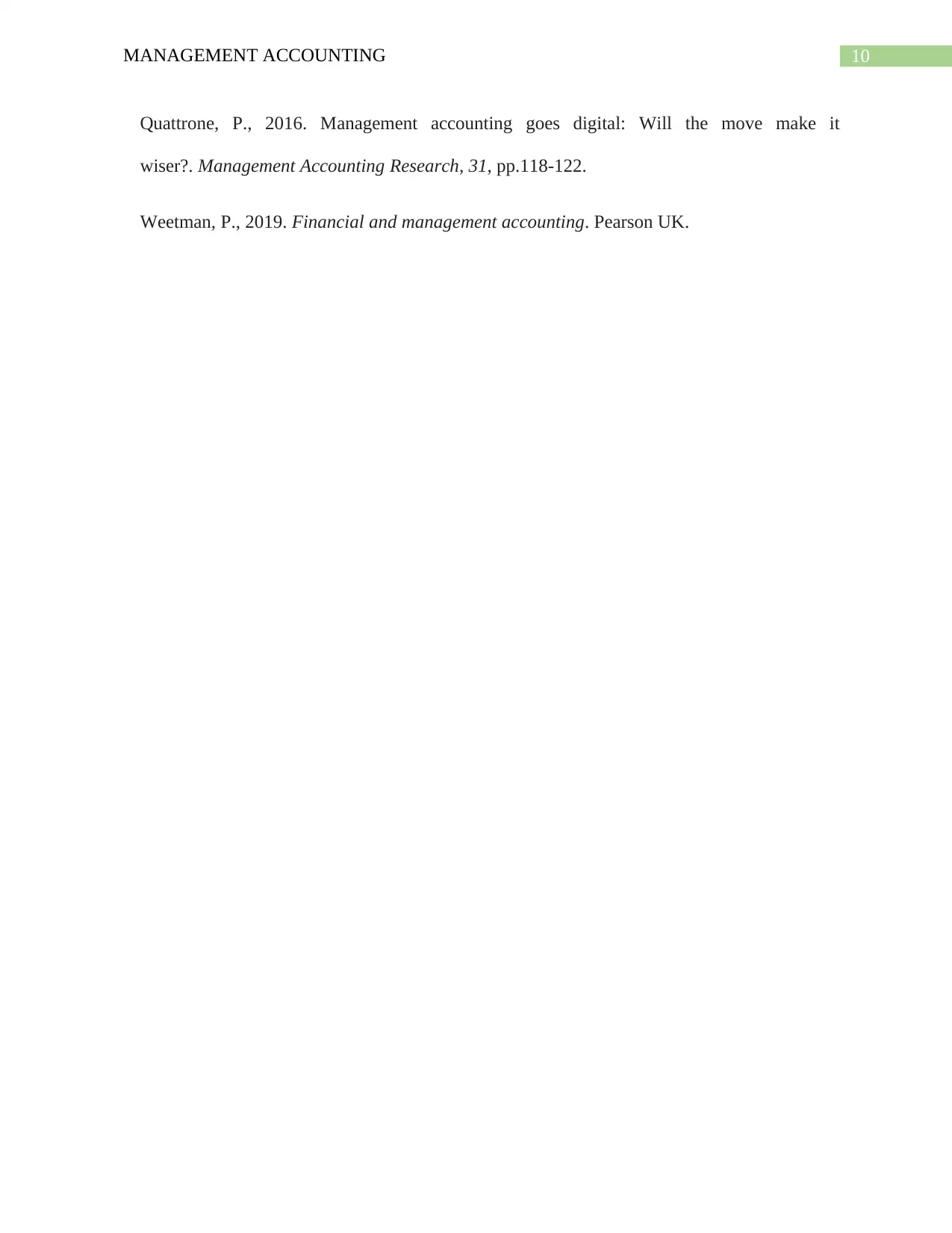
10MANAGEMENT ACCOUNTING
Quattrone, P., 2016. Management accounting goes digital: Will the move make it
wiser?. Management Accounting Research, 31, pp.118-122.
Weetman, P., 2019. Financial and management accounting. Pearson UK.
Quattrone, P., 2016. Management accounting goes digital: Will the move make it
wiser?. Management Accounting Research, 31, pp.118-122.
Weetman, P., 2019. Financial and management accounting. Pearson UK.
1 out of 11
Related Documents
Your All-in-One AI-Powered Toolkit for Academic Success.
+13062052269
info@desklib.com
Available 24*7 on WhatsApp / Email
![[object Object]](/_next/static/media/star-bottom.7253800d.svg)
Unlock your academic potential
Copyright © 2020–2026 A2Z Services. All Rights Reserved. Developed and managed by ZUCOL.





